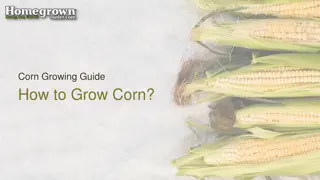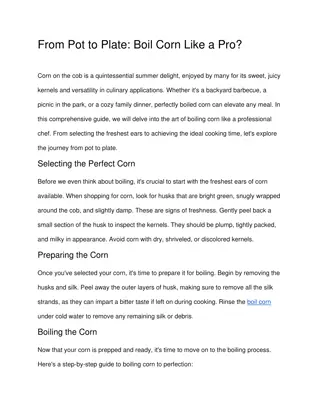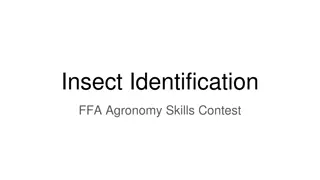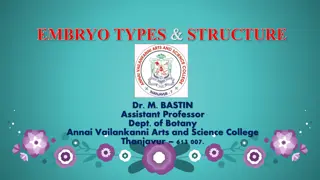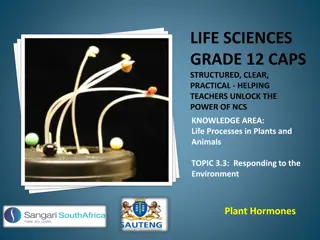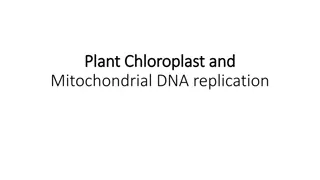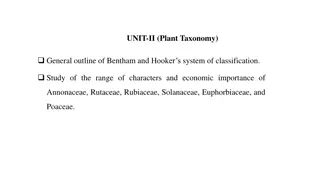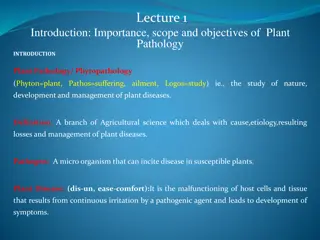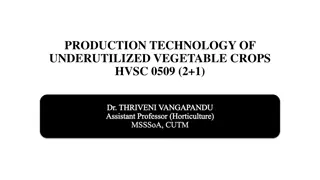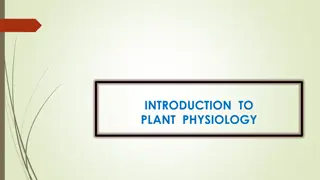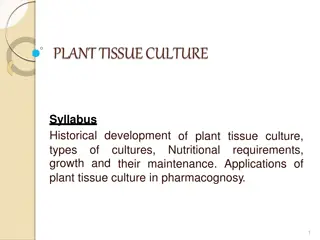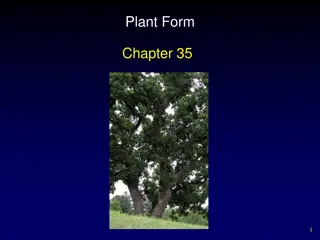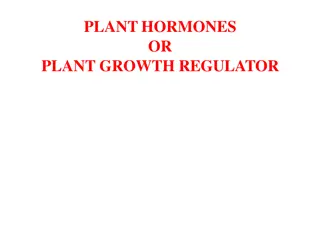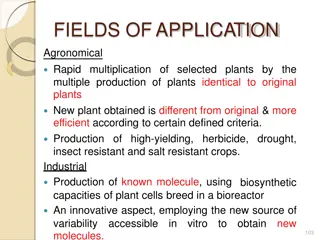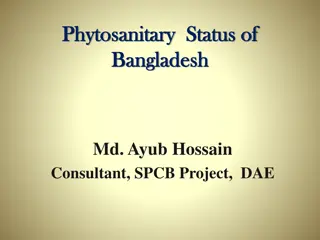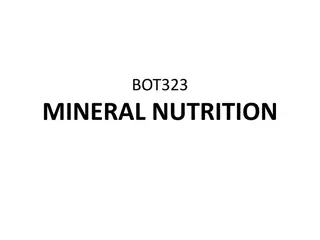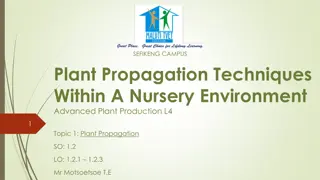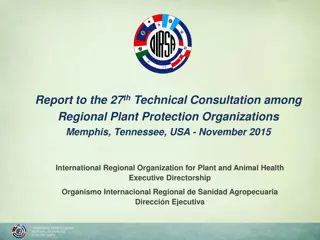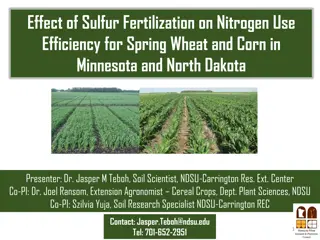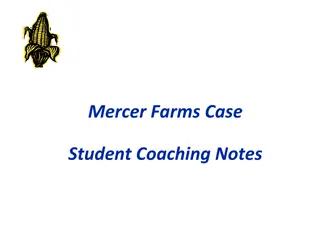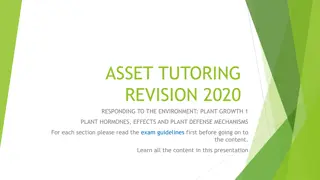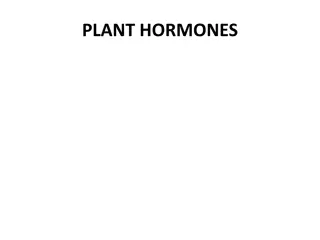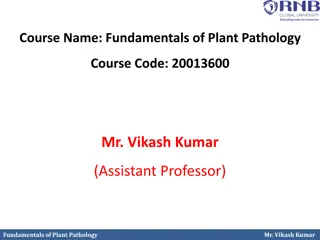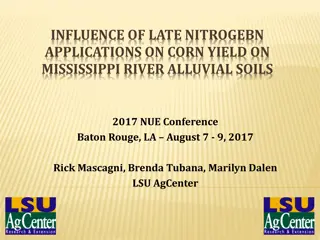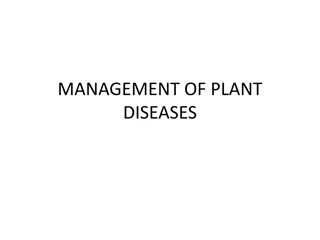Unit 1: Introduction and History of plant pathology
The science of plant pathology, which studies plant diseases and aims to protect the food supply by improving plant survival in unfavorable conditions. Explore the causes of plant diseases, their symptoms, and methods of prevention and control.
5 views • 13 slides
Biomarker and Companion Diagnostics Event-20th - 21st June 2024 -Boston, USA
MarketsandMarkets brings to you the Biomarker and Companion Diagnostics Conference scheduled to be held on 20th - 21st June 2024 in Boston, USA. This event will have an introduction to turning biomarkers into companion diagnostics.\n\nEnquire Now @ https:\/\/events.marketsandmarkets.com\/2nd-annual-
4 views • 5 slides
Amway Nutrilite All Plant Protein Powder 1kg Deutsche Post AG
Amway Nutrilite All Plant Protein Powder is a premium source of protein derived from plant-based ingredients. With each serving, you get a blend of high-quality protein to support your active lifestyle and dietary needs.\nAmway Nutrilite All Plant Protein Powder offers a convenient way to supplement
1 views • 4 slides
Biomarker and Companion Diagnostics Conference -USA (20th - 21st June 2024)
MarketsandMarkets brings to you the Biomarker and Companion Diagnostics Conference scheduled to be held on 20th - 21st June 2024 in Boston, USA. This event will have an introduction to turning biomarkers into companion diagnostics.\n\nBecome a Speaker @ \/\/events.marketsandmarkets.com\/2nd-annual-b
1 views • 6 slides
Production Technology of Sweet & Baby Corn Varieties and Cultivars Overview
Introduction to the production technology, nutritive value, and classification of sweet and baby corn varieties and cultivars. Covers the origin, types of corn, and specific cultivars developed in India with characteristics and utility. Includes information on nutritive values and cultivation region
2 views • 12 slides
How to Grow Corn
Discover the critical steps for how to grow corn successfully, from soil prep to harvest. Learn about planting, watering, pest control, and harvesting techniques from experts. Start your journey to a thriving corn crop today!
2 views • 12 slides
How to Grow Corn
Discover the critical steps for how to grow corn successfully, from soil prep to harvest. Learn about planting, watering, pest control, and harvesting techniques from experts. Start your journey to a thriving corn crop today!
0 views • 12 slides
How to Grow Corn
Discover the critical steps for how to grow corn successfully, from soil prep to harvest. Learn about planting, watering, pest control, and harvesting techniques from experts. Start your journey to a thriving corn crop today!
0 views • 12 slides
From Pot to Plate: Boil Corn Like a Pro
Corn on the cob is a beloved summer treat enjoyed by many around the world. Whether you're attending a backyard barbecue, a family picnic, or simply craving a taste of summer, boiled corn on the cob is a staple dish that never fails to delight
0 views • 4 slides
Insect Identification for FFA Agronomy Skills Contest
Explore a variety of insects including the Alfalfa Weevil, Aphid, Army Worm, Assassin Bug, Bean Leaf Beetle, Black Cutworm, Chinch Bug, Colorado Potato Beetle, Common Stalk Borer, Corn Earworm, Corn Rootworm, Cricket, Cucumber Beetle, European Corn Borer, Flea Beetle, Grasshopper, Green Lacewing, Gr
1 views • 37 slides
Understanding Plant Embryogenesis: A Comprehensive Overview
Plant embryogenesis is a crucial process in the development of plant embryos from fertilized ovules, involving cell division, differentiation, and morphogenesis. This process leads to the formation of seeds, which play a vital role in the plant life cycle. The stages of embryo formation, structure,
0 views • 25 slides
Understanding Plant Tissue Culture: Methods and Requirements
Plant tissue culture involves the in-vitro culture of plant explants under aseptic conditions, covering cell, organ, and suspension cultures. This process, pioneered by German botanist Gottlieb Haberlandt, relies on the totipotency of plant cells. Key requirements include laboratory organization, su
0 views • 18 slides
Understanding Plant Hormones and Their Functions in Plants
Plant hormones play crucial roles in various plant processes such as growth, development, and response to environmental stimuli. Auxins, gibberellins, and abscisic acid are key plant hormones that regulate tropisms, cell division, elongation, flowering, seed germination, and dormancy. Understanding
0 views • 50 slides
Plant Mitochondrial and Chloroplast DNA Replication Mechanisms
Plant mitochondria and chloroplasts have intricate DNA replication processes. Mitochondrial DNA replication is independent of the plant cell cycle and is associated with specific proteins in nucleoid complexes. Plant mtDNA contains more genes than animal mtDNA, with a complex structure involving int
1 views • 16 slides
Overview of Bentham and Hooker's Classification System in Plant Taxonomy
Bentham and Hooker's system of classification in plant taxonomy, outlined in Genera Plantarum, provided detailed descriptions of families and genera based on original plant dissections. This classification system has practical value for plant identification, with keys for taxa and subdivisions for l
2 views • 47 slides
Understanding Plant Tissue Culture Media and Their Importance in In Vitro Growth
Plant tissue culture media play a crucial role in the in vitro growth and morphogenesis of plant tissues. The composition of culture media depends on the specific plant species and the type of material used for culture. Various types of media, such as White's medium, MS medium, B5 medium, N6 medium,
0 views • 6 slides
Understanding Plant Pathology: Importance, Scope, and Objectives
Plant pathology, also known as phytopathology, is the study of plant diseases and their management. It covers the causes, symptoms, and impact of pathogenic organisms on plants. The field aims to understand the interactions between plants and pathogens, develop control methods, and reduce losses in
0 views • 6 slides
Production Technology of Underutilized Vegetable Crops HVSC 0509 & Sweet Baby Corn
This informative piece discusses the production technology of underutilized vegetable crops and the cultivation practices of sweet baby corn. It covers aspects such as the origin of baby corn, its nutritive value, different types of corn, major cultivars in India, and more. The content highlights th
4 views • 12 slides
Introduction to Plant Physiology: Exploring the Functioning of Plants
Plant physiology is a crucial subdiscipline of botany that delves into the processes and functions operating within plants. This field closely examines areas like plant morphology, ecology, cell biology, and genetics, shedding light on vital processes such as photosynthesis, respiration, and more. T
1 views • 7 slides
European Standards for Plant Biostimulants Development
The European Committee for Standardization (CEN) plays a crucial role in developing European standards for plant biostimulants, focusing on improving plant nutrition processes independently of nutrient content. The CEN/TC.455 committee is responsible for creating standards supporting the EU Fertilis
2 views • 5 slides
Understanding Plant Tissue Culture: Techniques and Applications
Plant tissue culture involves maintaining and growing plant cells, tissues, or organs in artificial mediums under controlled conditions. It allows the regeneration of whole plants from small plant parts or cells. Hormones like auxins, cytokinins, and gibberellins are used in the process. Proper envi
3 views • 5 slides
Understanding Common Food Additives: Corn Syrup, Dextrose, Evaporated Cane Juice, Hydrogenated Vegetable Oil
Explore the properties and uses of common food additives like corn syrup, dextrose, evaporated cane juice, and hydrogenated vegetable oil. Learn where these additives are found, their impact on health, and key facts to be aware of. Discover insights about weight gain concerns related to high fructos
0 views • 16 slides
Plant Tissue Culture: Historical Development, Techniques, and Applications
Plant tissue culture is an experimental technique that involves the in-vitro cultivation of plant cells to produce secondary metabolites, regenerate plants, and study organogenesis. This process allows for the maintenance of disease-free plant material, biosynthetic pathway tracing, and cell immobil
0 views • 21 slides
Understanding Plant Meristems and Growth Patterns
Explore the fascinating world of plant meristems, the small clumps of cells responsible for elongation of roots and shoots, as well as the different types of primary meristems and their roles in plant growth. Learn about apical and lateral meristems, primary tissues, and the organization of the plan
0 views • 33 slides
Understanding Plant Hormones and Growth Regulators
Plant growth regulators, also known as plant hormones, play a crucial role in regulating growth and development in plants. They are organic compounds that act at low concentrations to promote, inhibit, or modify growth processes. The main plant hormones include auxins, cytokinins, gibberellins, absc
1 views • 40 slides
Genetic Analysis of Corn Muffin Mix: GMO and Plant-Based Findings
A study conducted on Corn Muffin Mix using electrophoresis revealed that the sample is both genetically modified and plant-based. The results suggest that the GMO used in the study may also be genetically modified. The analysis was supported by visual data and information about the Jiffy brand known
0 views • 4 slides
Plant Tissue Culture Methods for Growth and Reproduction Study
Plant tissue culture methods such as root tip culture, shoot-tip culture, leaf culture, flower culture, and anther and pollen culture allow for the study of growth, reproduction, and genetic variations in plants. These techniques involve culturing various plant parts under sterile conditions to inve
1 views • 20 slides
Plant Tissue Culture Applications in Agriculture and Biotechnology
Plant tissue culture technology is a versatile tool used in agronomy and biotechnology for rapid multiplication of selected plants, production of high-yielding, herbicide, drought, insect, and salt-resistant crops, as well as the generation of phytopharmaceuticals, secondary metabolites, and novel c
0 views • 17 slides
Understanding Plant Quarantine and Phytosanitary Measures
Plant quarantine involves efforts to prevent the entry, establishment, or spread of foreign pests through legal restrictions on plant and plant product movement. It is crucial for safeguarding plant health, food production, and ecosystems. Phytosanitary measures aim to ensure the health of plants by
0 views • 33 slides
Understanding Mineral Nutrition in Plants
Mineral nutrition in plants involves the acquisition of essential elements in the form of inorganic ions from soil, followed by their absorption and utilization in various plant processes. Around 60 different elements have been reported in plants, with 30 being essential for plant growth. These esse
0 views • 39 slides
Plant Propagation Techniques in Nursery Environment
Learn about plant propagation techniques within a nursery environment, including nursery operations, potting seedlings, plant protection, weed control, packing of nursery plants, and crafting tissues for plant growth. Explore the essential tasks involved in nurturing seedlings and trees before they
0 views • 17 slides
Plant Health Initiatives at the 27th Technical Consultation Among Regional Plant Protection Organizations - Memphis, Tennessee
The 27th Technical Consultation in Memphis, Tennessee focused on plant health initiatives by the International Regional Organization for Plant and Animal Health. OIRSA emphasized four key technical areas: plant health, animal health, agricultural quarantine, and food safety. Projects included addres
0 views • 13 slides
Effect of Sulfur Fertilization on Nitrogen Use Efficiency for Spring Wheat and Corn
This research project, conducted by Dr. Jasper M. Teboh and his team at NDSU, investigates the impact of sulfur fertilization on nitrogen use efficiency for spring wheat and corn in Minnesota and North Dakota. The study aims to determine if wheat or corn respond to sulfur application, how sulfur aff
0 views • 25 slides
Maximizing Profit in a Corn Production Scenario
In a perfectly competitive labor market producing corn, we aim to determine the optimal number of farmworkers to hire for profit maximization. By comparing the Marginal Revenue Product and Marginal Factor Cost, we analyze the additional corn production with each added worker. Through step-by-step ca
0 views • 12 slides
Mercer Farms Case Study Analysis: Corn Planting Decision
Mercer Farms, faced with the decision to switch from AA Corn to GM Corn, seeks to optimize profits while managing price uncertainties. Key issues include determining which corn type to plant in each field, handling GM corn price variations, and calculating profits from the recommended strategy. With
0 views • 12 slides
Plant Growth Hormones and Defense Mechanisms: Understanding Plant Responses to the Environment
Plant growth hormones and defense mechanisms play crucial roles in how plants respond to environmental stimuli such as water, sunlight, gravity, and more. From auxins promoting cell growth to gibberellins stimulating flowering, this presentation educates on the intricacies of plant hormones and thei
0 views • 13 slides
Understanding Plant Hormones and Their Role in Growth and Development
Plant hormones are vital compounds that regulate various processes in plant growth and development. They are mostly organic and can be gases. These hormones are produced in one part of the plant and transported to other parts where they induce physiological effects. The main phytohormones include Au
0 views • 125 slides
Exploring the Fundamentals of Plant Pathology: Understanding Viruses in Plant Diseases
Delve into the world of plant pathology with Mr. Vikash Kumar, as you learn about the nature, structure, and transmission of viruses affecting plants. Explore the important characteristics of plant viruses, their unique properties, and how they interact within plant cells. Gain insights into viral d
0 views • 14 slides
Influence of Late Nitrogen Applications on Corn Yield on Mississippi River Alluvial Soils - 2017 NUE Conference
Excessive rainfall in the lower Mississippi Delta can lead to late-season nitrogen deficiency in corn crops. Research conducted at the LSU AgCenter focused on evaluating the efficacy of supplemental nitrogen at late growth stages on Mississippi River alluvial soils. Field experiments from 2006 to 20
0 views • 19 slides
Overview of Plant Quarantine and Disease Management
Plant quarantine is a crucial practice that involves regulating the movement of plants and plant products to prevent the spread of pests and diseases. Originating with the first law in France in 1860, plant quarantine now encompasses various methods such as embargoes and inspections to safeguard pla
0 views • 11 slides






